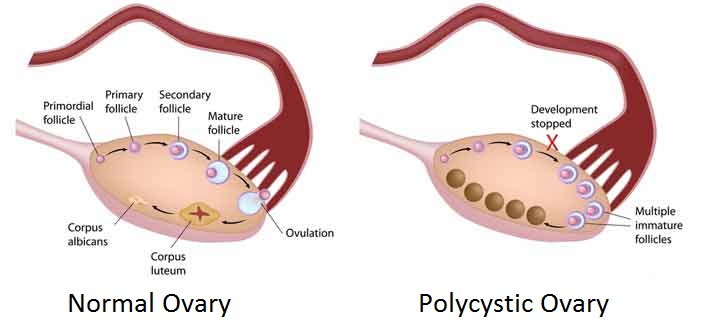Polycystic Ovary Syndrome (PCOS) or Polycystic Ovary Disorder (PCOD) is a problem in which woman’s hormones go out of the balance. It is refrred as the disorder when the ovaries (Making male and female hormone) tend to make male hormone than usual. If not treated on time, it may cause serious problems like diabetes or heart problems. Some may experience small cysts in their ovaries. These cysts are not directly harmful but may lead to hormonal imbalances.

Symptoms of PCOS/PCOD:-
Analysing the PCOS is not easy. There are following symptoms given below such as:
- Irregular periods are the common sign. You have face infrequent, irregular or prolonged menstrual cycles leading to fewer clots, heavy menstruation or approx. 9 cycle in a year.
- development of excess male hormone may lead to excess facial and body hair. The is due to the excess androgen leading to acne, male-pattern baldness
- Slightly large or lumpy ovaries.
- Weight gain or trouble losing weight
- Thinning hair on scalp
- Women may experience fertility problems due to which they become incapable to conceive. They may have pregnancy problems such as gestational diabetes, blood pressure or premature labor
- Depression and sleep apnoea
Any women can be caught by PCOS. Having timely consultation and treatment may stop the women to face the long-term risks rising through PCOS. Women experiencing two or more symptoms mentioned above must visit the doctor at the earliest to prevent and diagnose PCOS/PCOD.
Causes of PCOS or PCOD:-
The actual causes of PCOS/ PCOD is not fully understood, but following may be the common reasons causing PCOS or PCOD:-
- Excess Insulin: Insulin is a kind of hormone which is used in the pancreas to allow using sugar. If cells become resistant to the insulin, sugar level may rise. Excess insulin may lead to androgen production causing difficulty with ovulation
- Inflammation: Research has shown that women with PCOS have a type of low-grade inflammation that stimulates polycystic ovaries to produce androgens, which can lead to heart and blood vessel problems.
- Heredity or genetics: If PCOS runs in the family, there might be higher chances having PCOS. It may drive through father or mother. Excess Androgen
Complications and Risk Factors Involved in PCOS/ PCOD:-
PCOS or PolyCystic Syndrome is not directly harmful but it may lead to some complications which are:-
- Infertility, pregnancy issues, premature labor, miscarriage, high blood pressure
- Non-Alcoholic steatohepatitis - liver inflammation caused by an accumulation in the liver
- Sleep Apnoea
- Depression, Anxiety and eating disorders
- Diabetes
- Abnormal Uterine Bleeding
- Metabolic Syndrome causing the high risk of cardiovascular disease. It is the combination of high blood pressure, high sugar, abnormal cholesterol or triglyceride levels.
- Endometrial Cancer affecting uterine lining
- Obesity may worsen the complications
Diagnosis of PCOS or PCOD:-
There is no prescribed test to diagnose the PCOS or PCOD. Your doctor may ask you about your medical history pertaining to menstrual cycles, weight ranges, hair growth, acne or insulin resistance. After examining the physical health, doctor may undergo the following test like:-
- Pelvic Exam: The doctor may visually or manually inspect the growth or abnormalities of reproductive organs.
- Blood Tests: It is done to measure the hormone levels, blood sugars, insulin, lipids, cholesterol or triglyceride levels.
- Ultrasound: It is done to check for the thickness of the lining of the uterus or endometrium. The transducer is placed into the vagina to translate the images on a computer screen. Vaginal ultrasound helps to know the cyst if any.
- Other Tests or additional examinations may also be undertaken to evaluate cyst such as Screening for depression, anxiety, obstructive sleep apnoea, blood pressure, glucose tolerance, cholesterol etc.
Treatments for PCOS or PCOD:-
The treatments are offered to manage PCOS or PCOD symptoms to reduce the risk of diabetes, heart disease, and uterine cancer. The treatments of PCOS will entirely depend upon the type of PCOs or symptoms a woman is experiencing. Some of the Home-based and medical treatments are mentioned here:-
- Life Style Changes: If you have obesity or over-weight, one should try to lose weight as it will help to regulate blood sugars, insulin levels, the female hormone, ovulation, periods, and will improve acne, alopecia, and Hirsutism.
- Low-carbohydrate diet: Avoid crash diets if you are over-weighted low-carbohydrate diet will help to maintain sugar levels and insulin level. Add vegetables, fruits, nuts, beans, and whole grains
- Fitness Exercise helps to control the negative hormones. Control cholesterol level and weight gain. It also avoids diabetes and heart-related problems.
- Medication: It can be managed with the medication such as birth control pills containing estrogen and progestin decaying androgen production. Progestin therapy helps to regulate periods and protect against endometrial cancer. Clomiphene (Clomid), Letrozole (Femara), Metformin (Glucophage, Fortamet, others), Gonadotropins, Spironolactone (Aldactone), Eflornithine (Vaniqa), Electrolysis are some of the medicine which is given to control cysts and hair growth. The only doctor will prescribe the right medicine after analyzing your body completely.
- Infertility Treatment: If PCOS is the only reasons for non-pregnancy, fertility drugs will be prescribed. IVF is the final option for PCOS women who desire pregnancy.
- Surgery: It will not cure PCOS, however, it will help the women to become pregnant who are willing to become pregnant.
- Laparoscopic Ovarian Drilling – This is not done to treat the cyst but to destroy a portion of each ovary. it is usually performed using “Keyhole Surgery”.
- Bilateral Salpingo-oophorectomy and Hysterectomy – If a woman is not willing to become pregnant and sugaring with heavy pregnancy, fallopian tubes and ovaries are removed using laparoscopic and vaginal techniques. It may cause sudden menopause and preference hormone therapy may be considered.
Polycystic Ovary Management is done to control the PCOD and PCOS under the guidance of expert gynecologist in Gurgaon. PCOS Specialist will undertake the examination and will prescribe regular treatment to protect from the negative consequences. Women desiring pregnancy must consult with PCOS specialist to check and treat the signs of PCOS/ PCOD.

